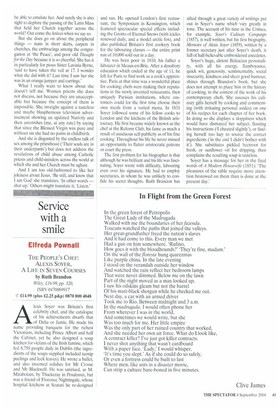Service with a smile
Elfreda Pownall
THE PEOPLE'S CHEF: ALEXIS SOYER, A LIFE IN SEVEN COURSES by Ruth Brandon Wiley, £16.99, pp. 320, ISBN 0470869917 E14.99 (plus £2.25 p&p) 0870 800 4848
Alexis Soyer was Britain's first celebrity chef, and the catalogue of his achievements dwarfs that of Delia or Jamie. He made his name providing banquets for the richest Victorians, including Prince Albert and half the Cabinet, yet he also designed a soup kitchen for victims of the Irish famine, which fed 8,750 people daily in Dublin (the ingredients of the soups supplied included turnip peelings and leek leaves). He wrote a ballet, and also invented relishes for Mr Crosse and Mr Blackwell. He was satirised, as M. Mirabolant, by Thackeray in Pendennis, but was a friend of Florence Nightingale, whose hospital kitchens at Scutari he re-designed
and ran. He opened London's first restaurant, the Symposium in Kensington, which featured spectacular special effects including the Grotto of Eternal Snows (with icicles renewed daily, and a model arctic fox), and also published Britain's first cookery book for the labouring classes — the entire print run of 10,000 sold out in a day.
He was born poor in 1810, his father a labourer in Meaux-en-Brie. After a desultory education which ended at the age of 11, he left for Paris to find work as a cook's apprentice. Paris at that time was a wonderful place for cooking; chefs were making their reputations in the newly invented restaurants, then uniquely Parisian institutions, where customers could for the first time choose their own meals from a varied menu. In 1831 Soyer followed some of his fellow cooks to London and the kitchens of the British aristocracy. He first became widely known as the chef at the Reform Club, his fame as much a result of assiduous self-publicity as of his fine cooking. Throughout his life he never missed an opportunity to flatter aristocratic patrons or court the press.
The first problem for his biographer is that although he was brilliant and his life was fascinating. Soyer wrote with difficulty, labouring even over his signature. He had to employ secretaries, in whom he was unlikely to confide his secret thoughts. Ruth Brandon has sifted through a great variety of writings put out in Soyer's name which vary greatly in tone. The account of his time in the Crimea, for example, Soyer's Culinary Campaign (1857), is well written, but his first biography, Memoirs of Alexis Sayer (1859), written by a former secretary just after Soyer's death, is full of half-believable embroidered anecdotes.
Soyer's huge, almost Balzacian personality, with all his energy, flamboyance, quick wit, generosity, sentimentality, social insecurity, kindness and sheer good humour, shines through Brandon's book, but she does not attempt to place him in the history of cooking, in the context of the work of his contemporary chefs. She assesses his culinary gifts herself by cooking and commenting (with irritating personal asides) on one of his recipes for each chapter of her book. In doing so she displays a sloppiness which would have dismayed her subject, flouting his instructions CI cheated slightly), or finding herself too lazy to source the correct ingredients ('in the end I didn't bother with it'). She substitutes pickled beetroot for fresh, or sunflower oil for dripping, then complains the resulting soup is tasteless.
Soyer has a message for her in the final words of A Modern Housewife (1851): 'The pleasures of the table require more attention bestowed on them than is done at the present day.'


































































 Previous page
Previous page